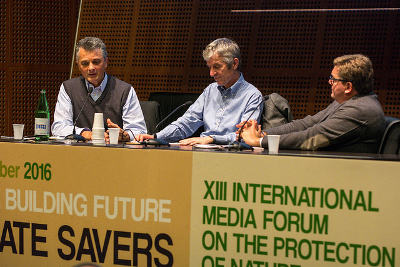Using AI to control energy for indoor agriculture
30 September 2024
Published online 6 November 2016
Climate change has a life raft in the Paris agreement, but is the Arab world on board?

© Associazione Culturale Greenaccord
The deal aims to limit the rise in global average temperatures to well below 2°C through capping emissions in whatever way each country determines is possible. Ultimately the goal is zero emissions by 2050, and the agreement sets out a framework for international cooperation to enable that target to be achieved.
But the Arab world has mixed feelings.
Although 18 countries of 22 in the MENA region eventually signed the non-binding deal, four countries – including Saudi Arabia, the region’s top oil producer and the largest CO2 emitter in the region – did not. So far, only the UAE, the Palestinian territories, Morocco, and Algeria have ratified the agreement.
During the 2015 Paris negotiations, Jamal Jaballah, head of the Department of Environment, Housing, Water Resources and Sustainable Development in the League of Arab States, had deemed the temperature target too ambitious for the Arab world, and said that it may well reduce food security and increase poverty.
On the sidelines of Greenaccord 2016, a forum that brings together scientists and media to discuss environmental issues, Nature Middle East sat with Michele Candotti, principal advisor to the executive director of the United Nations Environment Programme, to discuss the region’s commitment to the Paris agreements in light of its own ecological burden.
NME: What is the significance of the conference in general and for the Middle East region?
MC: COP 22 is the first [climate change] conference of parties after the Paris agreement. The world will come to terms with what they agreed a year ago and see whether the agreement still holds some prospects. Symbolically, whenever a geographic region hosts these conferences they have an opportunity to act as a refractory to international exposure. In this case, [they can] connect to the broader environmental agenda, the climate change agenda, exchange notes with other governments and be exposed to best practices, and also learn about private sector operators that are providing technological and financial alternatives.
NME: Some Arab countries have a big ecological footprint both in terms of the oil resources that drive their economies and the energy resources they use per capita. But the region also bears witness to the effects of climate change; longer summers, less water, greater human migration. What opportunities does this conference give Arab nations?
MC: In terms of mitigation, this region contains the majority of oil-producing countries at the heart of the fossil fuel dilemma. The region can prospect, analyse and compare notes on alternative solutions to fossil fuels for the longer, immediate and shorter terms. Also, these countries are exposed dramatically to climate-change effects, particularly water provision, and sustainable agricultural production. It is an opportunity for the region to learn how less endowed countries have already started preparing ahead of climate emergencies.
NME: Saudi Arabia has not signed the agreement. It is one of the biggest contributors in the region to the problem, and one of the few that has the infrastructure and capacity to support research into alternative solutions. At Marrakech, can you re-engage countries that have not signed up?
MC: The fact that the agreement has entered into force does not mean that the membership is now blocked. Marrakesh will be another opportunity to push and create a broader consensus on an agreement that is already in force. For some countries, particularly oil-producing countries, it is difficult to agree on dramatic shifts immediately.
I am sure that they will be the ones that eventually will be faster in taking up the contents of the Paris agreement even without signing. What they are not willing to do is to give up sovereignty in terms of their own economic choices. They will change at their own pace.
NME: What about other North African countries? Egypt, for example, signed the agreement but is struggling with the idea of making changes because the economic burden it implies is too great when the nation has not contributed substantially to the damages.
MC: Many developing nations ask why they should suffer the burden of responsibility when the problem has been generated somewhere else, mostly developed countries. This debate always focuses on the negative side -- what we are giving up. Instead we should look at the new economic and investment prospects that these agreements open up.
One example is in energy. Morocco is one of the countries with the biggest current investment in renewable energy, solar in particular. What does it mean? It means employment, technology, innovation, infrastructure development, the opportunity to reconfigure the way you live and develop the energy profile of the country. With energy solutions come the skills required to maintain them. It’s a new era for new skills, producing green jobs. It is important.
doi:10.1038/nmiddleeast.2016.200
Stay connected: